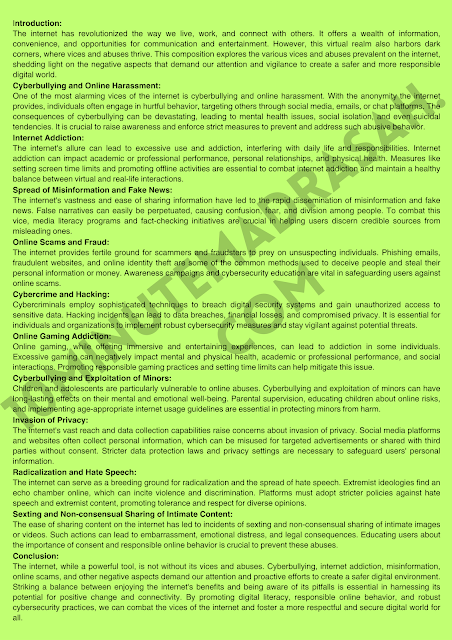Vice and Abuses of the Internet Composition/Essay for Class 8,9,10,11,12
Introduction:
The internet has revolutionized the way we live, work, and connect with others. It offers a wealth of information, convenience, and opportunities for communication and entertainment. However, this virtual realm also harbors dark corners, where vices and abuses thrive. This composition explores the various vices and abuses prevalent on the internet, shedding light on the negative aspects that demand our attention and vigilance to create a safer and more responsible digital world.
Cyberbullying and Online Harassment:
One of the most alarming vices of the internet is cyberbullying and online harassment. With the anonymity the internet provides, individuals often engage in hurtful behavior, targeting others through social media, emails, or chat platforms. The consequences of cyberbullying can be devastating, leading to mental health issues, social isolation, and even suicidal tendencies. It is crucial to raise awareness and enforce strict measures to prevent and address such abusive behavior.
Internet Addiction:
The internet's allure can lead to excessive use and addiction, interfering with daily life and responsibilities. Internet addiction can impact academic or professional performance, personal relationships, and physical health. Measures like setting screen time limits and promoting offline activities are essential to combat internet addiction and maintain a healthy balance between virtual and real-life interactions.
Spread of Misinformation and Fake News:
The internet's vastness and ease of sharing information have led to the rapid dissemination of misinformation and fake news. False narratives can easily be perpetuated, causing confusion, fear, and division among people. To combat this vice, media literacy programs and fact-checking initiatives are crucial in helping users discern credible sources from misleading ones.
Online Scams and Fraud:
The internet provides fertile ground for scammers and fraudsters to prey on unsuspecting individuals. Phishing emails, fraudulent websites, and online identity theft are some of the common methods used to deceive people and steal their personal information or money. Awareness campaigns and cybersecurity education are vital in safeguarding users against online scams.
Cybercrime and Hacking:
Cybercriminals employ sophisticated techniques to breach digital security systems and gain unauthorized access to sensitive data. Hacking incidents can lead to data breaches, financial losses, and compromised privacy. It is essential for individuals and organizations to implement robust cybersecurity measures and stay vigilant against potential threats.
Online Gaming Addiction:
Online gaming, while offering immersive and entertaining experiences, can lead to addiction in some individuals. Excessive gaming can negatively impact mental and physical health, academic or professional performance, and social interactions. Promoting responsible gaming practices and setting time limits can help mitigate this issue.
Cyberbullying and Exploitation of Minors:
Children and adolescents are particularly vulnerable to online abuses. Cyberbullying and exploitation of minors can have long-lasting effects on their mental and emotional well-being. Parental supervision, educating children about online risks, and implementing age-appropriate internet usage guidelines are essential in protecting minors from harm.
Invasion of Privacy:
The internet's vast reach and data collection capabilities raise concerns about invasion of privacy. Social media platforms and websites often collect personal information, which can be misused for targeted advertisements or shared with third parties without consent. Stricter data protection laws and privacy settings are necessary to safeguard users' personal information.
Radicalization and Hate Speech:
The internet can serve as a breeding ground for radicalization and the spread of hate speech. Extremist ideologies find an echo chamber online, which can incite violence and discrimination. Platforms must adopt stricter policies against hate speech and extremist content, promoting tolerance and respect for diverse opinions.
Sexting and Non-consensual Sharing of Intimate Content:
The ease of sharing content on the internet has led to incidents of sexting and non-consensual sharing of intimate images or videos. Such actions can lead to embarrassment, emotional distress, and legal consequences. Educating users about the importance of consent and responsible online behavior is crucial to prevent these abuses.
Conclusion:
The internet, while a powerful tool, is not without its vices and abuses. Cyberbullying, internet addiction, misinformation, online scams, and other negative aspects demand our attention and proactive efforts to create a safer digital environment. Striking a balance between enjoying the internet's benefits and being aware of its pitfalls is essential in harnessing its potential for positive change and connectivity. By promoting digital literacy, responsible online behavior, and robust cybersecurity practices, we can combat the vices of the internet and foster a more respectful and secure digital world for all.


